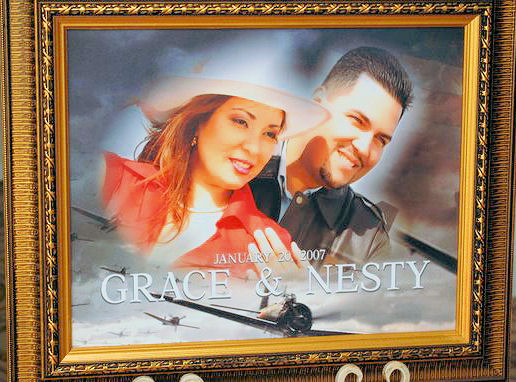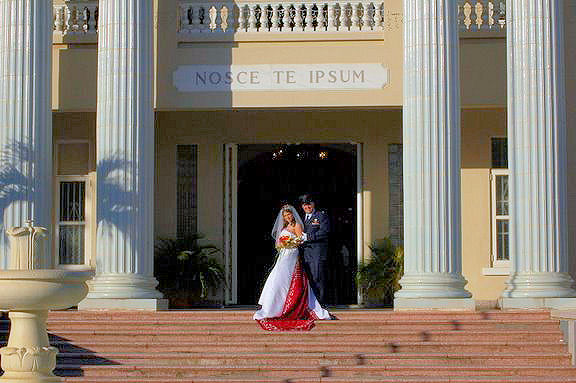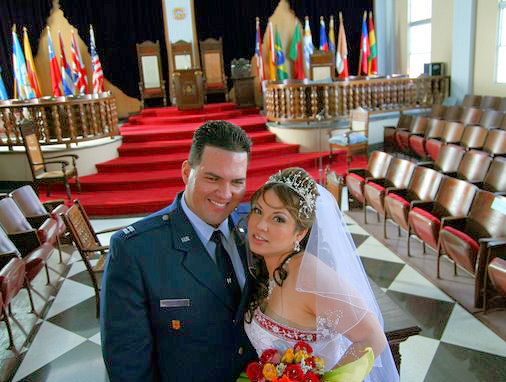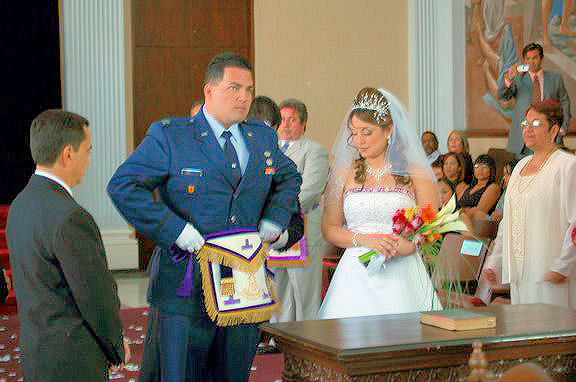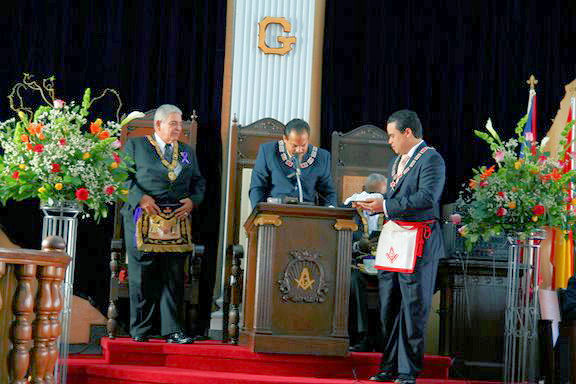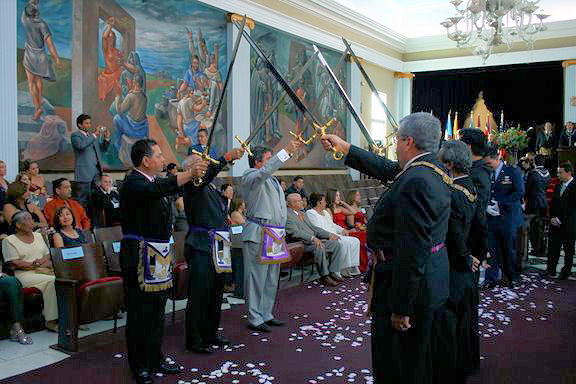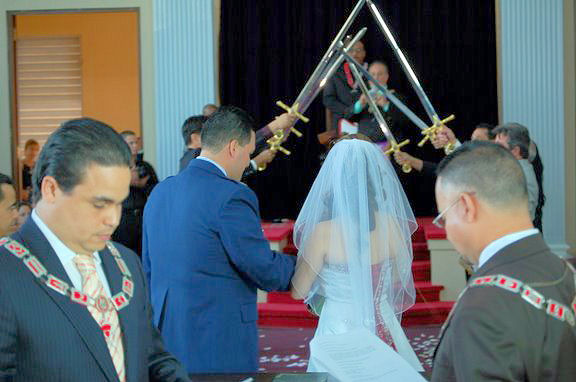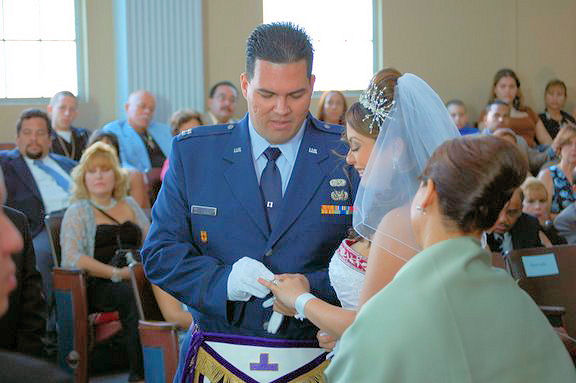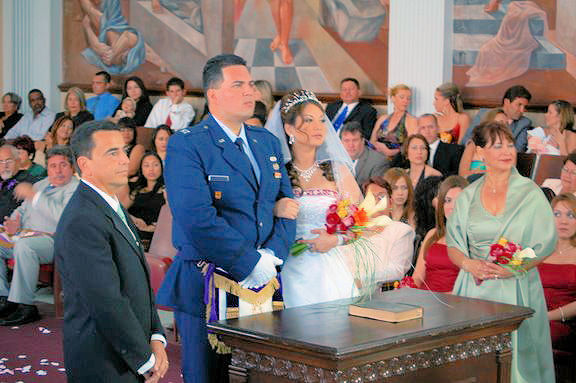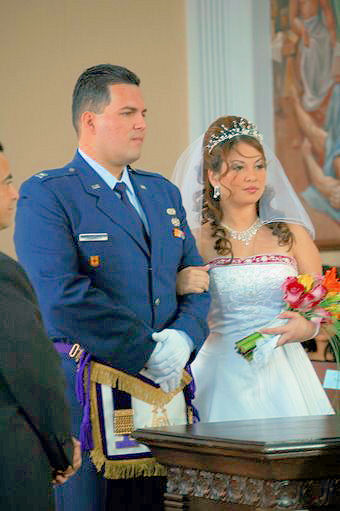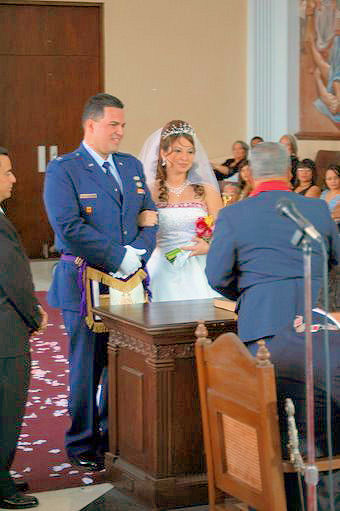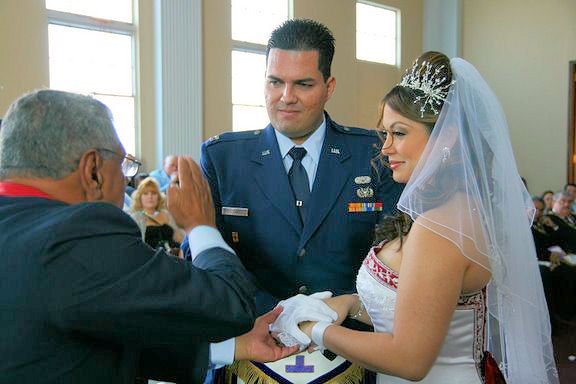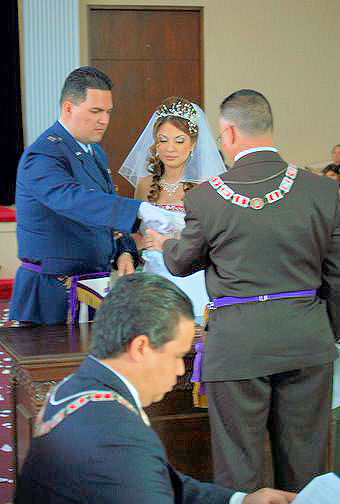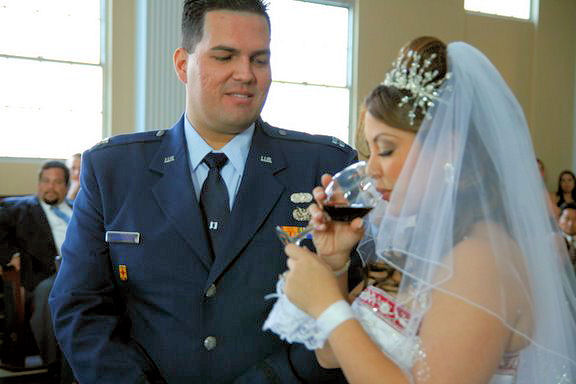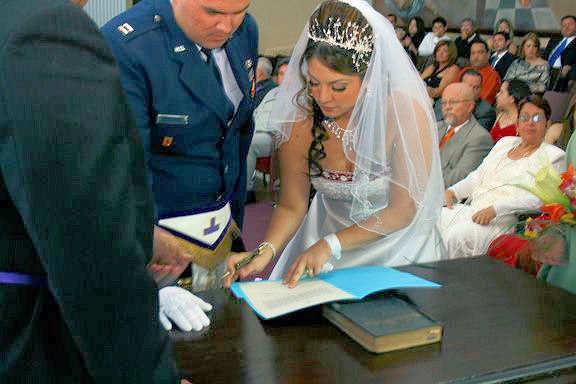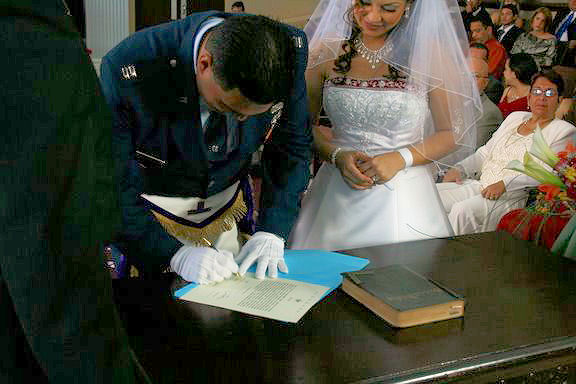A Masonic Wedding
Delivered in the Victorian Lodge of Research by Kent Henderson
Past Grand Sword Bearer - on July 23, 1993
A wedding, when mentioned in most circles, usually evokes pleasant thoughts, of a son or daughter commencing married life, of children, of grandchildren, the wedding day itself, the preparations, the happiness.
When we add the word Masonic to the occasion, what emotions are then aroused ? Incredulity mostly, I'd suggest. Most Masons, at least in this country, have never heard of such a thing. Indeed, most would immediately think - how could such be possible? Is not a wedding a religious occasion, and as such how can you have a Masonic wedding in our organization which is neither a religion or a substitute for a religion? Surely a wedding is for the church, not for the Masonic Temple ?
But is it ? Freemasonry is not a religion, but its content is certainly religious in character as are, indeed, many organizations that function outside church doors. Parliamentary proceedings are religious - they open with prayers, but I doubt anybody would consider parliament a religion ! In truth, of course, a marriage does not need to be celebrated in a church. Essentially, while clearly derived in our society from the Judeo-Christian tradition, marriage is defined in the Oxford Dictionary as the condition of man and woman legally united for the purpose of living together etc. Thus, despite the religious connotations many ascribe to it, marriage is but a civil act. All one needs is a legally-designated marriage celebrant (who may or may not be affiliated to a religion) to require an unmarried man and unmarried women to sign a legal document binding the signatories to matrimony in law.
Working backwards from the minimalist legal position, many religions have ceremonies to celebrate marriage, but marriage is not the sole preserve of religion. Many marrying couples, using a marriage celebrant can, and often do, write their own marriage ceremony. Why then, couldn't a Masonic Wedding ceremony be written ? The answer is there is no reason at all.
The next question is if one was written, would it be considered regular? If such a ceremony was permitted to be worked by craft lodges under a recognized Masonic Constitution, then it must be tacitly considered as regular at least. Whether ones own jurisdiction allows it to be analogously worked is a different matter, but that is irrelevant in the context of its regularity.
Now, I am here to tell you that a Masonic Wedding Ritual does exist. Not only does it exist, but it is officially sanctioned by at least one regular Grand Lodge (The Grand Lodge of Turkey), and is not infrequently used by its craft lodges. This ceremony, or one similar to it, is at least permitted to be worked in several other European jurisdictions. If you accept my logic as to regularity, the Wedding Ceremony must be considered a regular Craft ceremony by all Grand Lodges that recognize the Grand Lodges under which it is worked.
In giving an analogous example, in the context of our own Grand Lodge, you would mention our Masonic Funeral Ritual, or our Vacant Chair Ceremony. Be that as it may, it needs to be recognized that the ceremony is also worked under irregular Grand Lodges, notably in France, but that does not ipso facto make the ceremony itself irregular. I will refer again to this later.
I was fortunate enough to be invited to a Masonic Wedding Ceremony in Istanbul in 1986, hosted by a Turkish-speaking lodge. The ceremony, replete with bride and groom (indeed, two couples in this instance), took place in a Masonic Temple, followed by a full wedding breakfast in an adjoining banqueting area. Fortunately, there is an English-speaking Turkish lodge in Istanbul (Lodge Freedom No.35) from which I was able to obtain a copy of the ritual in English and to which I will shortly refer. However, prior to launching into a commentary on the ritual, it is useful to consider The Grand Lodge of Turkey and its background.
There is documented reference to the existence of lodges in Turkey in 1738, which appear to have emanated from various European sources. A Supreme Council of the Ottoman Empire was erected in 1861, probably under the patronage of the Grand Orient of France. The expansion of the Craft was slow in this era, with various Ottoman Sultans issuing edicts suppressing Freemasonry. The suppression became particularly harsh during the reign of Sultan Abdulhamid 11 (1876-1909) and many Turkish Masons were forced to flee the country. However, this repression did not appear to extend to lodges warranted from foreign countries. An English lodge - Oriental No 687 was formed in Turkey in 1856, and ten further English lodges were established between 1860 and 1870. Ireland, Scotland, and the Grand Orients of Italy and France also had lodges in Turkey in this period. Most English, speaking lodges had expired by the first world war. However, Oriental Lodge worked on into the 1930s. It did not survive the Second World War, and was formally erased in 1949.
Upon the coming of constitutional government to Turkey in 1909, Turkish Masonry revived and it is from this year that the current Grand Lodge dates it origin. The revival was in the form of a Supreme Council warranted from Egypt. In turn, the Supreme Council sponsored a National Grand Orient of Turkey which was constituted by 14 lodges then holding charters from either France, Italy, Belgium, or Spain. Expansion was sustained and by 1935 it possessed 65 lodges.
However, the political climate in the pre-war years deteriorated, and the Grand Orient of Turkey was dormant by 1935 and remained so until after the Second World War. The Turkish Supreme Council revived in 1948, and it controlled Turkish Craft lodges until 1956, when they were divested to a new Grand Lodge of Turkey founded on a regular basis. The Grand Lodge suffered a small split in 1966, when a Grand Orient of Turkey was formed. This body, endorsed by the irregular Grand Orient of France, still exists with about 30 lodges.
The regular Grand Lodge was recognized by the United Grand Lodge of England in 1970. Virtually all regular Grand Lodges in world have long since been in fraternal relations with The Grand Lodge of Turkey. In 1992. it reported 98 lodges, and a membership of 7,780.
Having looked very briefly at Turkish Masonic history, the question is in the current context, why a Turkish Masonic Wedding Ritual ? Where did this ritual come ? Indeed, is it used elsewhere in Masonry ? In order to gain at least some clues a look at the ceremony itself is a prerequisite.
As a beginning, let us consider the layout of the Temple for the Wedding Ceremony. The wardens sit in the places with which we are familiar - WJW (Worshipful Junior Warden) in the South, and the WSW (Worshipful Senior Warden) in the West. The difference is the WSW sits well forward of the west wall of the temple on the edge of the squared pavement flanked by the two great pillars (J & B) which dominant the lodge - reaching nearly to the ceiling. The use of the pillars thus is a quite typical continental-type practice. The RWM (Right Worshipful Master) is in the East. You will note that the designations of the principal officers are the same as those of the Scottish Constitution, and some European Grand Lodges. Indeed. Turkish Craft Ritual is in some ways similar to that practised under the Grand Lodge of Scotland, although Scotland was not its source, at least directly.
The other main feature is a altar in the centre of the Temple (in the middle of the squared pavement) -again, a continental-type feature. but also common in both Irish and American Masonry. As will be appreciated the large cross-fertilization of Masonic ritual across the world in the last few hundred years makes any study of ritual origins and influences a massive jigsaw, and well outside the scope of this paper.
In preparation for the ceremony the temple, officers pedestals, and the East are decorated with flowers. Brethren wear flowers in their lapels. Lodge officers wear two flowers, and the RWM wears three flowers, preferably with a red and white ribbon. Lodge Officers only wear their collars. Brethren do not wear their aprons but white gloves only. Sisters (as females are designated) when admitted sit in the South, while brethren sit in the North..,
A small table and two chairs are placed in front of the altar, facing the RWM, on which are a silver platter with the wedding rings, a glass of red wine, a glass of water, an empty glass, a glass rod and a blue ribbon long enough to encircle the newly weds. The table is decorated with flowers, and an incense burner is on the Secretary's table.
The lodge officers, members, and visiting brethren take their places in the Temple, and what is effectively an occasional lodge is opened by a single knock by the RWM, repeated by the WSW and WJW. The Director of Ceremonies (DC) retires with staff in hand, and admits the Sisters into the Lodge. The bride and groom wait outside.
The RWM asks everyone to he seated, and then introduces the proceedings thus.
Sisters and Brethren, we are gathered here today to celebrate and Masonically re-confirm the marriage of Sister and Brother , whose marriage was performed in accordance with the civil Laws of our country.
Here we now see that the ceremony is not for the purposes of legal marriage, but a re-confirmation ceremony. Upon reflection, of course, it could not be used per se to create a legal marriage unless the presiding officer, in this case the RWM, was in fact a legally designated civil marriage celebrant.
The RWM continues:
As you well know, Masons strive to gather men and women around an ideal of peace and to awaken in their hearts mutual love and affection.
Celebrating the union of two people who have decided to unite their lives in order to establish a family, avid reaffirming this union in the pure atmosphere created by our efforts for love and peace, will surely give this marriage a better meaning, create further understanding and harmony.
We. therefore, consider today's meeting to be unusually important and valuable; because we are today reaffirming a contract which helps to ensure the survival of humanity, to unite two people who love one another on the road to happiness and understanding, and because we thus have the opportunity to give voice to the spiritual uplift and moral satisfaction derived from our participation in celebrating their union.
That grand force directing the universe in an eternal order has put in the hearts of men and women created in this earth, the fire of love, the will and desire to unite and multiply.
The JD (Junior Deacon) then moves the Secretary's table, lights incense, and stands adjacent to the RWM.
The RWM continues:
Let the pleasant odour rising from the burning incense fill our hearts and the hearts of those who today honour us with their presence, with love for humanity, with love for the family. with affection and protection for the children. Short Pause.
Bro.J.D. please see whether the bride and groom have arrived, and if so bring them to the Temple.
The J.D. then leaves the lodge and after a short pause knocks four times. Thereafter follows a very familiar pattern of Masonic admission, as follows:
W.J.W.: RWM, there is a knock at the door.
R.W.M.: Investigate who seeks admission.
W.J.W.. Bro.Inner Guard, see who seeks admission.
I.G.: (After investigating). WJW, Bro.J.D. is at the door, accompanied by Sister . and Bro . who have been married in accordance with 'Our civil laws and who now desire to celebrate and reaffirm their union in this Worshipful Lodge.
The WJW then makes the same report to the RWM, who continues.
Brethren, form the dome of steel.
An equal number of Brethren appointed in advance form the dome with their swords down the North side of the lodge. You will note that the use of swords in this manner shows a distinct continental Masonic influence. There are others in the ritual, as we will see later. When they are in place the RWM then continues:
Bro J. D. lead the bride and groom to their places.
While this is happening, the Brethren forming the dome of steel knock the tips of their swords and the WSW and WJW their gavels. The organist plays the Wedding March. When the couple reach their places the RWM knocks once and all noise stops.
The ceremony continues as follows:
R.W.M.: Brother and Sister ..what is your wish?
Groom: Having fulfilled the requirements imposed upon us by the Laws of our country, we wish our marriage to be celebrated and Masonically reaffirmed by our brethren.
R.W.M.: Bro the brotherly feelings which prompt you to desire this ceremony are a source of pride to us. Family love is not only one of the basic principles of Masonry, but also a source of hope. We thank you for giving us the opportunity to live those sweet feelings once again. Please all be seated.
At this point the RWM then proceeds to give a short address about the duties and sacrifices required by couples for a happy marriage. No ritual is prescribed. Interestingly, if this was to occur in an English-type lodge such as ours, such an address would probably be ceded to the lodge chaplain. In Turkish lodges, there is no office of chaplain. Of course, a chaplain has Christian connotations which would not be compatible with Turkish Masonry wherein most members are Moslem. Nonetheless, the office of chaplain is rare in continental jurisdictions generally.
Upon completing his address, the ceremony continues:
R.W.M.: Bro do you feel that you have the strength to perform these duties?
Groom. Yes. RWM.
R.W.M.: Sister . do you also feel you possess this strength?
Bride: Yes, RWM.
R.W.M.: Sister do you promise to love and honour your husband, and be tied to him with bonds of respect, fidelity and trust ?
Bride: I do, RWM.
R.W.M.: Bro do you engage yourself to love and honour your wife and remain tied to her with bonds of fidelity and confidence?
Groom: I do, RWM
R.W.M.: Bro.J.D., burn more incense. (A short pause follows).
May these promises, which form the foundation of your happiness, rise to eternity like the pleasant smelling smoke rising from this burning incense. May this pleasant smell penetrate into your hearts and awaken in you feelings of sincerity and purity, and may mutual love and affection join you forever, without differences, of thought. of body and of property.
Brother . and Sister . give each other your hands.
Your holding hands is a sweet symbol of your desire to walk the path of life together. Even if on that road of togetherness something causes pain to one of you. If one somehow hurts the other, let a smile, an apology, an embrace make your differences remain superficial and never have time to reach your hearts and bruise them.
R.W.M.: Bro . and Sister . Please rise.
Bro.J.D. please tie the newly weds with the ribbon of unity.
The J.D. ties the blue ribbon over the left shoulder of the groom and around the waist of the bride.
R.W.M.: Make the dome of steel.
A number of brethren rise and form a semi-circle around the back of the newly weds, and form a dome with their swords, points touching.
R.W.W Put your ring on your wife's finger. Sister . you to put your ring on the finger of your husband. These rings have always symbolized eternal togetherness.
Bro.J.D. give the magic rod to the newly weds.
The J.D. gives the glass rod to the bride and groom saying:
Hold this magic rod each at either end.
R.W.M This rod symbolically wits us that mutual love should be clear and pure, and that carelessness can break it quickly. Let this rod always remind you that love, like a rare flower, must be cultivated and requires constant attention and care. See that it never breaks.
Bro.J.D. gives the glass of wine to Bro . and the glass of water to Sister .
The J.D. does this and standing opposite the couple, holds the empty glass in his hand.
R.W.M.: Bro . and Sister . empty your glasses into the one held by Bro J.D.
As the wine and water unite in this glass, may your different characters and qualities combine to provide harmony, happiness and prosperity for your family. Please drink from the same glass.
The J.D. offers the glass first to the bride, then to the groom.
Bro J.D. untie the newly weds. (Done). Brethren, please rise and form the chain of unity.
All brethren present form the Chain of Unity. The chain is broken between the WSW and WJW in the west. The bride and groom take position in the centre of the circle. The RWM is in centre East.
The Chain of Unity is very continental in character and found in many European Degree ceremonies. When complete all the brethren link hands. The symbolism, in Masonic terms, is quite obvious. The Chain of Unity is not to be detected in any English-form Craft Ritual of which I am aware, and indeed, in English Masonry it is only found as such in the Masonic Rosicrucian Society (S.R.I.A.), although echoes exist in The Royal and Select Masters, and the Ancient and Accepted Rite.
The ceremony continues:
W.S.W.: RWM, our chain is incomplete. A link is missing. Bro (the groom) has remained near his wife. Please ask him to join us to complete the chain.
R.W.M WSW, your wish will be fulfilled. Sister . please bring your husband to his place amongst us. This will symbolize that a Mason's wife will always support her husband's Masonic work.
Bro.J.D. remain with our Sister . to show her that a Mason's wife is never alone, never without our assistance and protection.
The J.D. leaves the Chain, leads the couple to the groom's place in the chain, and returns to the centre with the bride.
W.S.W.: RWM, our chain is now complete and perfect.
R.W.M.: As women, over the ages, through their understanding, Love and help, have eased the burden carried by men and as women have understood our legends, profound symbols and aims, making it easier for us to reach our goals, so has this chain been formed with the help of a new sister. Brethren, return to your places and be seated.
The J.D. now returns the couple to their places before the altar, telling them to remain standing. the RWM stands before them, facing them. He now "Masonically marries" them, as follows:
R.W.M.: Brother ..... and Sister . bow your heads in the presence of absolute truth (The RWM places his hands on the couple's heads). In the name of T.G.A.0.T.U., and being vested with authority by the M.W. Grand Lodge of Free and Accepted Masons of Turkey, and as RWM of this Worshipful Lodge ...... No I hereby Masonically reaffirm your marriage. May your union be happy and your promises sacred. I congratulate you and on behalf of all my brethren wish you every happiness. (The RWM returns to his place). All please rise. Sisters and Brethren, Masonry today is happy to celebrate the union of two people who have promised each other fidelity, love, affection, and mutual assistance as long as they live. Their promises are honourable and bear great value. Happy are those who fulfil their promises fully and with courage. Please be seated.
R.W.M.: Bro.J.D. take Bro . and Sister .first to the WSW and then to the MW so they can congratulate them on behalf of their respective pillars, and bring them between the two columns. (This is done).
WSW, the marriage of Bro . and Sister . now having been reaffirmed by this Worshipful Lodge. please announce it.
W.S.W.: From the East to the West and from the North to the South, I hereby announce to all men and Freemasons throughout the world that Bro . and Sister .are lawfully married and their marriage is reaffirmed by this Worshipful Lodge. (Applause).
R.WA.: Let us be seated. (The J.D. returns the bride and groom to their seats).
WSW, what is marriage?
W.S.W.: Marriage is the union of a wan and a women, into which both enter of their own free will and accord, to ensure the happiness and continuation of humanity. It is the union of two people who join their destinies to carry the burden of life more easily and to help each other on the road of life, RWM.
R.W.M.: WJW, how is happiness and strength created in marriage?
WJW; Since both parties enter into this union willingly to form a unified family and because it is this freedom of choice which makes their love to continue, the harvest of this can be nothing but happiness and strength, RWM.
R.W.M.: WSW, what should be done to ensure eternal happiness in marriage
W.S.W.: Keep marriage pure and noble without searching for material benefits. It is only then M hearts beat with such pure feelings that the chain of love remains a permanent and unbroken entity,
RWM. Bro.Orator do you have anything to add to these
The Orator then makes a short speech not exceeding ten minutes. In Turkish lodges, as in many continental lodges, the Orator is the lecture master of the lodge, invariably a senior and learned past master.
R.W.A.: Dear Sisters, execution of good deeds is one of the virtues loved and Practiced by masons We never leave any of our meetings without giving thought to the unfortunate. For this purpose a bag will now be circulated into which every brother can leave whatever amount of money he wishes, or from which any Bro. can take any amount he desires. The money collected is spent for philanthropic purposes. The reason why we make this collection discreetly is not to render the giver proud nor the receiver ashamed. Any sister who wishes to join us can do so as if she too was a Mason. Bro.Almoner please circulate the charity bag. Bro.J.D. please assist Bro.Almoner.
When this is done sweets or candy are circulated.
R.W.M.: Please all rise. Dear Sisters, thank you again for joining us today for this ceremony. Such ceremonies of joy and happiness bring men and women together and permit all to bask in mutual love and respect. We hope that your impressions of this ceremony will make you support us in our work more than before. Bro.J.D. accompany our Sister . and Bro . first, and then our Sisters out of the Temple. We will join them in a short while. (This is done).
R.W.M.: Brethren, I declare our labours closed.
He knocks once, followed by the WSW and WJW. The D.C. then leads the RWM, and his Wardens, out of the Temple.
It now only remains to delve into the origins of the Wedding Ritual. Inquiries in Istanbul reveal that the ritual has been used by Turkish Lodges since the revival of Turkish Masonry in 1909. The ritual came to Turkish Masonry from Belgium about this time - almost certainly from the Grand Orient of Belgium. In turn, Belgian Masonry obtained the ceremony from the French. Whether the ceremony is still worked within irregular Belgian Masonry is not clear, though information to hand suggests it is not worked (at least officially) under the Regular. Grand Lodge of Belgium.
The ritual itself appears to have been horn in pre-revolutionary France and it has always been a part of irregular French Masonry, particularly under the Grand Orient of France. Be that as it may, as I alluded earlier, the ceremony itself is not ipso facto irregular. The Grand Orient of France did not sink into irregularity until the second half of the 19th Century, long after the Wedding Ceremonial first appeared.
Before, during and after the French Revolution (1789) there was certainly a movement in France to replace religious ceremonies with civil ceremonies. This probably explains how, in Continental Freemasonry, a number of ceremonies were added over the years relating to family events.
It was this era in which the Wedding Ceremony appeared, and which also fostered what were known as Adoptive Lodges in France and elsewhere in Europe, as well as several other diversions such as androgynous Masonry. The Ceremony of Adoption of Children of the Lodge was generally only held on the request of a brother, and then usually only every 3 to 5 years. Hence, an adoption ceremony would be for a group of children, usually about twelve years of age.
Of course, there exist today a large number of Family Orders associated with Freemasonry, particularly in the U.S.A., such as The Order of the Eastern Star, DeMolay, Job's Daughters, etc. None of these can be considered as Masonic, as such, although this view is not universally held. For example, while The Grand Lodge of Scotland does not object to the Order of the Eastern Star, its English counterpart does not permit its members to be associated with it.
In the Dictionnaire de la Franc Maηonnerie (Daniel Ligou), under the heading Reconnaissance Conjugale, the Wedding Ceremony is described as tenue blanche , i.e. "holding to the purity", where the spouses, bound by a string, share bread and wine. Ligou claims the Wedding Ritual springs from the French Le Droit Hurnain (Co-Masonry). However, as Adoptive Lodges thrived in France and elsewhere in Europe in the 19th Century in particular, and that Le Droit Humain was not officially formed until 1893, Ligou probably confused the two.
Nonetheless, some suggest that the use of the term "sisters" in the ritual indicates a strong Co-Masonic link and that this alone is grounds enough to call the ritual irregular. This is erroneous as Co-Masonry uses the term "brother" to describe all its members, both male and female. In any case, as we have just seen, available evidence suggests the ceremony has no historical links with Co-Masonry but in fact substantially pre-dates it. One body which does use the term "sister" is The Order of the Eastern Star, but that organization certainly has. no connection with the Wedding Ritual.
Returning to the Wedding Ceremony itself, it seems that various although similar rituals are used in varying locations. Given the history of the divergences of Craft ritual, this will astound nobody. Evidence to hand suggests that a Wedding Ceremony is worked intermittently under the irregular French Grand Lodges. It is certainly worked under the regular Grand Lodges of Greece and Turkey and has been worked at least once in The Netherlands (see the Appendix below). It would come as no surprise to find it worked elsewhere in Europe.
In conclusion, the Wedding Ceremony is used to varying extents across a section of regular Freemasonry, and must therefore be judged as such, as indeed it clearly is. Regardless of its origins and position in the
Masonic framework, it is difficult to escape the fact that the Wedding Ritual itself is one of very great beauty. Its symbolism, such as that of the glass rod, the mixing of water and wine, and the chain of unity, hold great meaning. It is not surprising, therefore, that the ceremony holds a cherished place within the realm of the Grand Lodge of Turkey and, one assumes, within other Grand Lodges under which it is worked.
Appendix
An interesting article appeared in a Dutch Masonic Magazine (A.M.T. Sept.1979, P. 16) concerning a Wedding Ceremony held in Utrecht. It is reproduced below with its accompanying photograph. A translation of the text is as follows:
Masonic Wedding in Lodge "Hermannus van Tongeren".
The brethren of Lodge Hermannus van Tongeren, in the East of Utrecht, experienced on Saturday 9 June 1979 a unique meeting in the Temple, under the leadership of Bro.H.van Eck, W.M.
On that day, the wedding of one of its members, Bro. B. A.A. Kesselring and Miss I. Borrius was confirmed and dedicated in Masonic style, a few hours after the civil wedding was performed.
After those present, the members of the happy pair's families, their friends and many brethren were welcomed by the W.M. and informed of the special place the Temple occupies in the activities of the Lodge, the Master of Ceremonies conducted everybody into the Temple. Thereafter the bride and groom were fetched and. accompanied by organ music, were brought into the flower-decorated Temple.
The meeting was opened by a dialogue between the W.M. and both Wardens, specially created for the purpose. The W.M. in his address pointed among others to our principles which are deeply religious and humane. He referred to the (Dutch Masonic) axiom: "It depends on you" which demonstrates in an inescapable manner how much we are responsible for our own happiness.
The symbolical journey through life made thereafter finished at the altar where the bride and groom knelt and where in the midst of their family, friends and brethren, the solemn confirmation of the wedding took place.
After the rings were exchanged, one single white rose was given to the bride - as the most beautiful symbol that we as Freemasons know - as well as a small silver Trowel. The ceremony was concluded with a dialogue.
As can be seen even from the limited information contained in this article this ceremony while similar to the Turkish version, has its differences. Interestingly, the article seems to indicate that this particular ceremony was the first ever performed in the Netherlands, and this assertion is supported from the fact that an opening and closing ritual were specially created for it. It will be noted that essentially the Turkish version is devoid of an opening and closing ritual of any consequence, and this seems indicative also.
The "first ever performance is also supported by the exhaustive research of my research lodge colleague W.Bro.Hank van Tongeren, a. brother of Dutch descent to whom I am grateful for the above translation. He asserts that following an extensive search of the indexes of all post war issues of THOTH, an authoritative Dutch Masonic publication, and all Dutch Masonic rituals, he can find no reference to the Wedding Ceremony. Of course, one can readily speculate where the Dutch lodge concerned gained the ritual.
Post-Script to Appendix
Upon inquiries in The Netherlands, we received a copy of the actual ritual used in the Dutch Ceremony mentioned in the article. Our advice is that the ritual was "specially created for the occasion. However, The Grand East of the Netherlands subsequently took a dim view of the matter and forbade its use in its lodges. Therefore, this particular ceremony was used on this one occasion only and has not been used in Dutch Masonry since. Nonetheless, in the context of the current paper it makes interesting reading.
Wedding Confirmation of Bro Boudewijn Kesselring and Irma Borrius on 9 June 1979 in Lodge Hermannus van Tongeren. *
Preparations
The Bride and Groom are received in the Board Room, where flowers are placed on the table. A Table is placed in the Forecourt to sign the Reception Book, looked after by a Brother. In the Temple (Lodge Room), white flowers are placed near the (lesser) lights W, S and B, and a bouquet of flowers in a vase in the East (in the manner of a F C s passing (ceremony)). On the Altar is the Bible, opened at 1Corinthian13 and placed thereon are the Square and Compasses (1st Degree). At the West side of the Altar a kneeling cushion is placed. The (lesser) lights are lit, as are the candies on the tables (pedestals) of both Wardens *and the W M . The All Seeing Eye is illuminated, and the ceiling light above the Altar switched on. The lights in the Temple are switched low (subdued). There is no Tableau. In its place is a carpet on which are placed seats for the Bride and Groom. The Wardens and the W M sit in their normal places. Dress is evening dress (tails); collars are worn but no apron or gloves. Seam for family are reserved in both front rows. Seats for the D C and Orator are also reserved.
After the Bride and Groom are seated in the Board Room and every one has gathered in the Forecourt, the W M addresses those present:
W M Respected Brethren, family and friends,
I bid you all a hearty welcome on this special day. At the request of Br Boudewijn Kesselring and in a few moments time his marriage to Irma Borrius shall be confirmed in the Het bruidspaar Kesselring-Borrius in de Tempel van het 0:. Utrecht.
Temple in Masonic style. For those who do not know our Temple, 1 want to draw attention to the special place the Temple occupies in our lodge activities. This Temple is not a church, and during our meetings all our acts have a symbolic meaning. When we enter the Temple we enter into a space which, for us, is a consecrated - a sacred space, with an atmosphere in which the meetings - directed away from the outside world - are focused on a closer relationship with the Supreme Being. And in this atmosphere the wedding shall presently be confirmed.
Bro Director of Ceremonies, you will now conduct every one to the Temple and when all are seated, I request you return to usher in myself and both Wardens.
At their entrance, all remain seated. The W M and both Wardens walk in the posture of Fidelity and sit down simultaneously.
W M Before I proceed to open this ceremony, I want to make a few announcements.
1. Would you please rise when the Bride and Groom enter, and I ask that the Brm adopt the posture of Fidelity.
2. At the end of the ceremony all will exit the Temple with the exception of the Bride and Groom who will remain behind with me.
3. That will happen after 1 have closed the meeting and you
are requested by the Director of Ceremonies to depart.
Bro D C you will now solemnly usher in the Bride and Groom and ask them to be seated. This occurs. The Bride and Groom are received with every one standing and with triumphant music.
Please be seated.
OPENING
W M Now that the ceremony shall commence. I request Bro Wardens to assist me.
Bro S W , what is our duty, now that we have come together here?
S W To concentrate on the labour that awaits us.
W M Bro J W, why are we presently assembled in our Temple?
J W W M , we have assembled because one of our brethren has requested his wedding be masonically confirmed.
W M Bro S W , are we ready to commence the proceedings?
S W The moment has arrived. We have opened ourselves to this sacred atmosphere, so that harmony and peace may descend in our hearts.
W M Then I open this special ceremony , the masonic confirmation of the marriage of our Bro Boudewijn Kesselring with Irma Borrius.
JW May Love illuminate our path through life.
S W May our faith support our a 1 aspirations.
W.M May our trust in ultimate Beauty govern our life.
The Inner Guard now switches on full lighting.
W M This ceremony is opened; may this hour be blessed.
Bro Musician underlines this with a few chords.
After this, the W M gives the following address to the Bride and Groom.
CEREMONY
W M Dear Bride and Groom,
You announced your wish to have your wedding, which was carried out today, confirmed in our Temple, and this makes us happy. After all, this wish is the expression of your sincere intention, jointly to be true to our principles which are deeply religious and noble minded. By its acceptation, you have set yourselves a difficult objective in life through which your life can be brought to its highest expression. However, never forget that Freemasonry is not an end in itself, but merely a means to an end: a resource to acquire correct insight and sufficient strength through the considerable tests with which life presents us. Through these tests and while striving after an existence in complete harmony, a man cannot be in want of the support of his wife. That you, the Bride who hardly knows of Freemasonry, have followed your husband with full confidence into our Temple, makes us most grateful. Although our membership excludes women, at the initiation we clearly give witness of our respect for "the woman" - the wife of our Brother who indirectly is involved in our labour.
And this is totally proper, because the first and most important workplace of the Freemason is within his family.. And now, in this sacred atmosphere, full of peace, full of brotherly love, the bond which exists shall be considered in its purest light, through which you shall become conscious that happiness in the first place does not depend on earthly possessions, but that it can be found within ourselves. In the midst of those dear to you and surrounded by those of like mind and your friends, the solemn confirmation of your wedding shall take place. Your path through life shall lead over sunny heights, through worlds of radiating light, where you may experience the greatest happiness. But life shall also lead you through valleys, where dirt and rocks shall hinder your progress. Thus you shall need to find support in each other. This shall raise the nexus, which has now been made, above the bond made by human law. Bride and Groom, you have entered into your marriage with' the knowledge that both of you are imperfect human beings - as we all are. It is therefore a good thing for you both to realise once more, that you have chosen each other as you are, to live together in your own reality. Both must learn to employ the trowel of love, to smooth imperfections. Presently you shall be asked if it is your sincere desire to strive after the development of all the qualities of spirit and mind, which shall raise you marriage to a higher spiritual and moral level. If that desire is present within you, you shall succeed. 1 say this to you, not as a preacher; however as W M and as your companion it is my duty to ensure you realise the spiritual basis of the step you have taken on this significant day. Also because of the fact that through this ceremony you will accept an obligation towards the Lodge. The knowledge that the harmonious development of your marriage is potentially present should make you happy. And with this happiness you can now, in our Temple, commence your symbolic journey through life.
Bro D C , you will precede the Bride and Groom on their path.
The Bride and Groom walk hand in hand. Bro Musician accompanies them with music, and briefly stops playing when they are at the W M and the Wardens pedestals. In the. East they. halt and face the W M . Bro Musician stops during the address.
W M (To the Bride and Groom)
Know that your journey cannot always lead over made roads. Shadows will also be present, and perhaps darkness. Still you will proceed, guided by the inner light of Wisdom and supported by faith in the Almighty.
The Inner Guard towers the lights during the journey through the South. At the S W pedestal they halt and turn towards him. *
S W Remember always that the belief in the victory of Truth shall provide the necessary Strength.
At the J W pedestal they halt and turn towards him.
J W, In your house, when harmony and love reigns, you shall always find the right path which shall lead you to ultimate Beauty.
From here the journey is continued to the Altar. Both Wardens follow the Bride and Groom. The W M takes a position on the East side facing South, the Bride and Groom on the South side facing East, and the S and J W on the South and North sides respectively, facing inwards. Bro Musician now stops playing.
W M In a symbolical manner you have given proof of your earnest desire to advance through the rest of your life as a dual being. We now approach the culmination of this ceremony. Before you - on top of the Altar - the Bible is placed, on top of which is the Square and Compasses. For us this is a sacred symbol, upon which you will soon give your confirmation.
The Compasses - a symbol of radiating energy.
The Square - a symbol of justice and sincerity.
The Bible - a symbol of Truth and Love.
Page 56
The Bible is opened at 1 Corinthians Chapter 13, in which the cement of the wedding is described further. Bro Orator, read to us some extracts from this Chapter dealing with love* so that we, at this sacred moment, may once again be impressed with its great worth.
Bro Orator places himself behind the Bride and Groom's seats.
Bro Or Love# suffereth long, and is kind;
Love#envieth not;
Love# vaunted not itself, is not puffed up,
Doth not behave itself unseemly, seeketh not her own, is not easily provoked, thinketh no evil;
Rejoices not in iniquity, but rejoices in the truth;
Beareth all things, believes all things, hopeth all things, endureth all things.
NOTE: In the Dutch Bible, this Chapter is entitled "The Song of Love" and where "Charity" appears in the Authorised King James Version, the word "love" appears in the Dutch version.
W M (addresses the Bride and Groom)
I now request you both kneel and place your right hand on the Bible. (This is done)
Will every one please rise, and I ask that the Brethren adopt the posture of Fidelity.
THE CONFIRMATION
W M Boudewijn Kesselring and Irma Borrius,
Are you ready to confirm, before our Altar of Truth, that it is your sincere wish to elevate your marriage to a state of Harmony by striving jointly towards the development of all those qualities of mind and spirit which can raise the state of matrimony to a higher spiritual and moral level? Are you ready to strive jointly in your fatuity after the realisation of Masonic principles throughout your life?
Boudewijn Kesselring, what is your answer? (YES)
Irma Borrius, what is your answer? (YES)
May your readiness receive the blessings of the G.A.0.T.U.
Bro. Boudewijn Kesselring and Irma Borrius, by virtue of my power, granted to me by you and by our Brethren of Lodge Hermannus van Tongeren, I herewith conclude this solemn confirmation of your wedding, and I declare you are united in Masonic marriage.
Wisdom (places hand on Irma's shoulder)
Strength (places hand on Boudewijn's shoulder)
Beauty (places both hands on their right hands)
May this sacred bond be blessed, and this hour be unforgettable.
Rise, Brother and Sister Kesselring.
Will every one please be seated.
Both Wardens remain standing. Bro Orator returns to his seat.
W M You have placed two gold rings before me, symbols of faith, the faithfulness you have promised each other.
Groom, you will place this ring on your wife's finger.
Bride, You will place this ring on your husband's finger.
Dear Bride, I now present to you this single white rose. For your husband it represents one of the most beautiful symbols he, as a Freemason, knows. Keep this rose as a reminder of this solemn moment, and may it direct your thoughts to the place where it was handed to you.
Bro D C., please escort the Bride and Groom to their seats.
When the Bride and Groom are seated, the W M and both Wardens return to their places. After this, Br Musician plays an item of music. This is followed by an address by the W M.
W M Dear Bride and Groom,
Your wedding has now been Masonically confirmed in the presence of those near and dear to you, and filled with happiness we shall remember that moment when both of you were united through Wisdom, Strength and Beauty before our Altar. Totally in accordance with the character of Freemasonry have you made this voluntary confirmation, and this makes us thankful.
Bro Kesselring, At your initiation, you were acquainted with the words: "it depends on you" and, in an inescapable manner this demonstrated how greatly you are responsibility for your own destiny - for your own happiness.
Sister Kesselring,
On the night your husband was made a Freemason it was strongly impressed upon him that it is he, and he alone, who must shape his life. Today 1 want to repeat these words "It depends on you" to you both. 'No one in the world can do something that would guarantee the success of your marriage. That you must do yourself. Every person is like a world, and much wisdom and much love is necessary to ensure two persons - two worlds - can live together in harmony. 1 wish you both Health, Blessings and Prosperity* on your path to life's happiness.
(*Heil,, Zegen en Voorspoed" - a traditional Dutch Masonic expression)
W M Respected Brethren, Family and Friends, 1 hope this sacred meeting has been meaningful and inspiring, not only for the Bride and Groom, but for all of us. Together we have confirmed the wedding of these two people, and with them we have made the symbolic journey through life in our Temple. The thoughts of many of us will return to that moment when we too began that journey in love and with confidence. May we have experienced again that peace reigns where love dwells.
CLOSING
W M I will now proceed to close this ceremony. Every one please rise.
Bro J W what is the hour?
J W It is time to end our labours, W M
W M Bro S W , are the labours ended?
S W The labours are ended for the present, W M .
W M Then Faith Hope and Love (Charity!) remain, these three but the greatest of these is Love.
Go in peace.
Br D C leads every one out of the Temple (including the Wardens) except the Bride and Groom, who remain behind with the W M.
During the exit, Bro Musician plays suitable music and is the last one to depart. He closes the door behind him.
W M Sister Irma Kesselring,
In this consecrated space your husband has made an obligation which is sacred to him; and of which 1 want to remind you, Br Boudewijn. I will leave you by yourselves for a moment - alone in our Temple as a symbol that no one but yourselves can ensure your happiness. Know then that to make' happy, is 'to be' happy. Boudewijn and Irma, jointly enter into a strong covenant, and may the G.A.0.T.U. illuminate your path through life.
Page 59
The WM departs the Temple and waits outside the door. After a few moments the WM asks the Bride and Groom to leave the Temple and they are placed in front of the Temple door .
The W M breaks up the meeting with a few words of thanks.
This ritual was kindly translated from the Dutch by W Bro.Hank van Tongeren of the Lodge of Research No.218.
Authors Footnote:
In August 1993, I applied to the Manager of the Williamstown Masonic Centre in Melbourne to use its Masonic Temple for my forthcoming marriage to my fiancιe Marise de Quadros. The booking was accepted. Some weeks later the matter came to the attention of the Grand Secretary of the United Grand Lodge of Victoria, who advised the Williamstown Masonic Center Committee of Management in the following terms:
The Grand Master advises that it is his policy and that of the Board of General Purposes that no Wedding should be held in a Lodge Room, the main objection being that it could indicate support for the erroneous criticism of Freemasonry by certain elements in the community that Freemasonry is a "pseudo religion" and, therefore, incompatible with Christianity or other recognized religion. It has been confirmed that this policy is common throughout all Australian Grand Lodges. This policy also applies to any other type of service which is not Masonic in nature.
Nonetheless, despite this ruling, the Grand Secretary also agreed that the Williamstown Masonic center Committee of Management was an autonomous body and any decision made concerning the booking for the wedding was a matter for it. The Committee of Management subsequently took the view that the booking had been arranged in good faith by the parties involved prior to the opinion of Grand Lodge being sort, and voted unanimously to confirm it.
As a result of this confirmation, my wedding took place in the Williamstown Masonic Temple on the 19 December 1993. It appears to have been the first wedding to occur in any Victorian Masonic Temple and possibly in Australia. However, given the policy of the Australian Grand Lodges, it could well be the last.
My wedding itself was a civil ceremony and approximately eighty family and friends were present, many of whom were Freemasons. I will add that I consider my wedding to have been a personal and private matter, and as far as I am concerned any speculation about the form of the ceremony used will remain just that.
Questions and Answers
Question by W Bro Bill White:
How often is the ceremony conducted in Turkish Lodges?
Response
The ceremony is worked as required, somewhat similar to our vacant chair ceremony. It is not worked unless a lodge member requests it. I understand that lodges working it more than once a year are rare and that some lodges go for several years without using it at all.
Question by W Bro Tony Bowers:
You mentioned swords in the creation of the dome. Are swords standard in the lodge?
Response
When the bride and groom enter they do so under an arch of steel. An arch of steel is common in Continental Freemasonry, especially in the first degree.
Question by W Bro Mac Bedwell:
Would they have a Koran open on the pedestal?
Response
From the photos accompanying this paper you will see three sacred volumes on the pedestal in a Turkish lodge. They are the Old Testament, the New Testament and the Koran. They are laid across each other, not side by side, with the square and compasses across all three.
Question by W Bro Hank van Tongeren:
Do the Sisters have a special place to sit in the lodge?
Response
Yes. The ladies sit in the south. the brethren in the north.
Question by W Bro Michael Moore:
The altar is in the centre and the chain of unity around it. Where do the bride and groom stand?
Response
They stand in front of the altar. The altar has three candles on three corners representing the lesser lights, as is common in Europe, Ireland and America.
Question by WBro Bill Harding:
Were all the individuals involved Muslims? The ceremony as you describe it seems far more Christian than Islamic for reasons such as the wedding rings - which in Islamic custom are exchanged at the engagement not at the wedding.
Response
Yes, the vast majority of Turkish Masons are at least nominally Muslim. In answer to the rest of your question two observations can be made. Firstly, the origin of the ritual is European so its original construction was against a Judeo/Christian background. Of course, the ritual itself is de-christianized, although the ceremony retains Christian connotations such as the rings. Nonetheless, these matters are clearly not an issue in Turkish Masonry else the ceremony would not be used. It also needs to be appreciated that, virtually alone in the Islamic world, Turkey is a secular state. This, more than anything, allows the Craft to both exist and prosper in that country. Few lodges exist in other Islamic countries and in most the Craft is proscribed.
This Just In!
Greetings Brethren!My name is Jesus E. Delgado, I'm a Past Master of the Respetable Logia Antorcha de Oriente # 65 under the jurisdiction of the Grand Lodge of F. & A. Masons of Puerto Rico. I'm also a member of the AASR, the KT and the Shrine.On January 20, 2007 I was married in a Masonic Ceremony that took place at the Main Temple of the Grand Lodge of Puerto Rico in Santrurce. My new wife Grace and I (Nesty) wanted to share some of the pictures of our wedding pictures with the visitors to your museum.Thanks for your wonderful work your website does in favor of Freemasonry!Be blessed by the Grand Architect of the Universe!Together in Faith! Best Wishes!W.:B.: Jesus E. Delgado, 32Ί, KT
Grace and Nesty on the steps of the Grand Lodge of Puerto Rico
Getting ready for the Masonic wedding ceremony
Entrance into the Lodge room under a vault of steel
Exchanging the wedding bands
Exchanging their vows
As a part of their Masonic ceremony a toast was made with a single glass of wine and then the glass was broken!
Signing of the Masonic wedding certificate
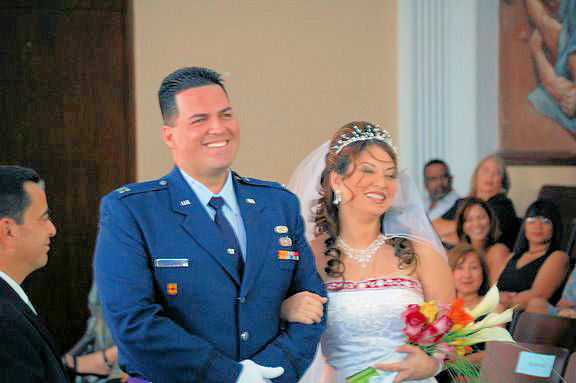
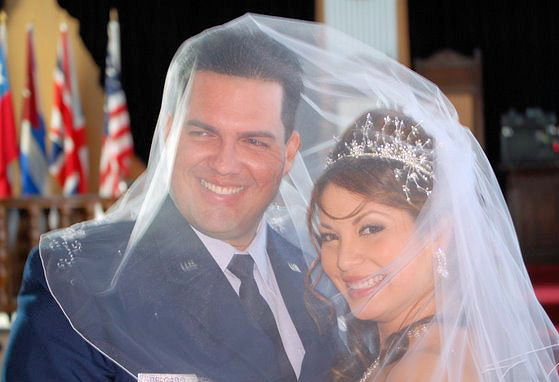
Dear Worshipful Brother Nesty and Grace:
Thank you for sharing your beautiful wedding pictures with us! May you both, along with your future family, live long, happy and prosperous lives! Congratulations!
Sincerely and Fraternally yours,
David Lettelier, PM, Curator, Phoenixmasonry Masonic Museum
![]()

